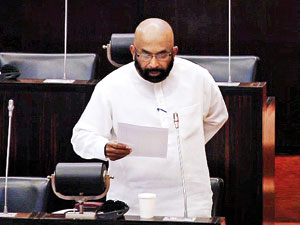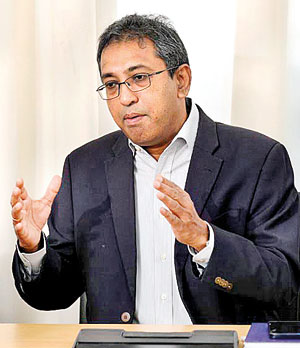Columns
Taxes and corruption: Heat over tackling or not tackling twin issues
View(s):By Sandun Jayawardana

State Finance Minister Ranjith Siyambalapitiya
Opening the debate, State Finance Minister Ranjith Siyambalapitiya criticised the opposition for behaving like a “traditional opposition” at a time when the country was affected with an unprecedented economic crisis. He pointed to a question raised by Opposition Leader Sajith Premadasa, where he said the International Monetary Fund (IMF) had conveyed that the government had failed to meet targets on increasing tax revenue. Mr Premadasa however, had stated elsewhere in the same question that the government was imposing high taxes on professionals, including through the Pay As You Earn (PAYE) tax. “On the one hand, he is saying our tax revenue is low, while on the other, he is saying we are burdening professionals. This is what I mean when I say they are being a traditional opposition.”
Mr Siyambalapitiya noted that 95% of the government’s revenue comes from taxes and the government was faced with the huge challenge of increasing tax revenue within a closed economy. “The ability to pay taxes decreases within a closed economy but we are asking institutions such as Customs and Inland Revenue Department to increase their tax revenue despite this. We are essentially asking them to swim upstream,” he told the House.
The government was also impeded by outdated laws that cannot be changed immediately. The Excise Law for example, came into effect in 1913. Meanwhile, income tax payments are according to self-assessment, where a taxpayer calculates how much tax they have to pay.
While the need to introduce new technology for tax collection has been stressed, there are challenges in this regard as well. Nevertheless, the government hopes for higher tax revenue when the upgraded version of the Revenue Administration Management Information System (RAMIS) is introduced by the end of the year, said Mr Siyambalapitiya.
The IMF has highlighted the high amount of corruption that exists within Sri Lanka Customs, Sri Lanka Podujana Peramuna (SLPP) MP Mahindananda Aluthgamage said. The government expects Rs. 1217 billion as revenue from Customs in 2023, but only Rs. 655 billion or 53% of the target revenue has been collected thus far.
“About 3000 containers come to Customs on a daily basis. About 30% of them go to another terminal under the Board of Investment (BoI). None is subjected to inspection,” said Mr Aluthgamage, who further alleged that there were no facilities to inspect about 95% of containers.
Though an import ban on vehicles has been in effect for several years, Mr Aluthgamage claimed there were brand new vehicles in the market, including vehicles manufactured in 2019/2020; after the import ban came into effect. “Not only have they come out of Customs, they have been registered by the Department of Motor Traffic. What is the use of a Customs then?”
The MP said the best way to minimise corruption was to digitalise institutions such as Sri Lanka Customs and the Inland Revenue Department and link them. However, there is resistance to these efforts from within these institutions, he alleged. 
A report by the World Bank has shown that if Sri Lanka changes its tariff policy, the composition of its imports and the countries it imports to, export earnings that currently stand at about USD 10 billion can be doubled within a short span of time, said independent MP Patali Champika Ranawaka. If the tariff policy is changed correctly, it would balance out the difference between import expenditure and export revenue and resolve the shortage of dollars, meaning Sri Lanka would not have to go begging for funds. Unfortunately the Finance Ministry, though aware of the World Bank’s analysis, has not taken any steps to follow its recommendations, he claimed.
Regarding the issue of corruption, Mr Ranawaka noted that though it has been two years, no one has been brought to book over the sugar tax scam that resulted in the State losing Rs. 16 billion. Yet, the government has imposed high rates of PAYE tax on 248, 000 professionals who earn salaries in excess of Rs.100, 000. This group, which is the most important segment related to the country’s administration, is now leaving in droves because they are discouraged by the high rate of tax they are forced to pay, he claimed. “The lack of accountability for those involved in scams such as the sugar tax scam has left professionals wondering why they should stay on when the law is applied differently to them.”
The IMF’s Diagnostic Assessment on Governance clearly notes that most government institutions are extremely corrupt from the top down, noted Samagi Jana Balawegaya (SJB) MP Dr. Harsha De Silva. It is one of the reasons that the IMF had cited for not releasing the second tranche of the bailout package to Sri Lanka. The IMF has given a 16-point plan to Sri Lanka to address governance challenges and this includes key measures the country needs to take within specified timeframes to tackle corruption, he pointed out.

Samagi Jana Balawegaya (SJB) MP Dr Harsha De Silva
There are questions though on whether the government is serious about tackling corruption and enhancing transparency, observed Dr. De Silva, who is also Chairman of Parliament’s Committee on Public Finance. He noted that recently, a proposal came before COPF to give a 17-year tax rebate to one institution. “I only asked one question, which was how much tax revenue would this cost the State. They didn’t know. In the end, they tried to sling mud at me and remove me as COPF Chairman, but now the IMF has imposed a condition that if a tax rebate is given, the country must be informed how much tax revenue would be lost as a result of it.”
Dr De Silva noted that the IMF has also instructed Sri Lanka to amend tax legislation to eliminate or restrict ministerial authority to introduce tax changes without prior parliamentary approval and ensure that such changes do not generate revenue losses. This if implemented, would put a stop to scams such as the sugar tax scam, which resulted from a midnight gazette issued by the then minister that slashed the tax from Rs. 50 to 25 cents overnight, he further said.
Parliament reconvenes at 9.30 a.m. on October 17.
Buying or selling electronics has never been easier with the help of Hitad.lk! We, at Hitad.lk, hear your needs and endeavour to provide you with the perfect listings of electronics; because we have listings for nearly anything! Search for your favourite electronic items for sale on Hitad.lk today!


Leave a Reply
Post Comment